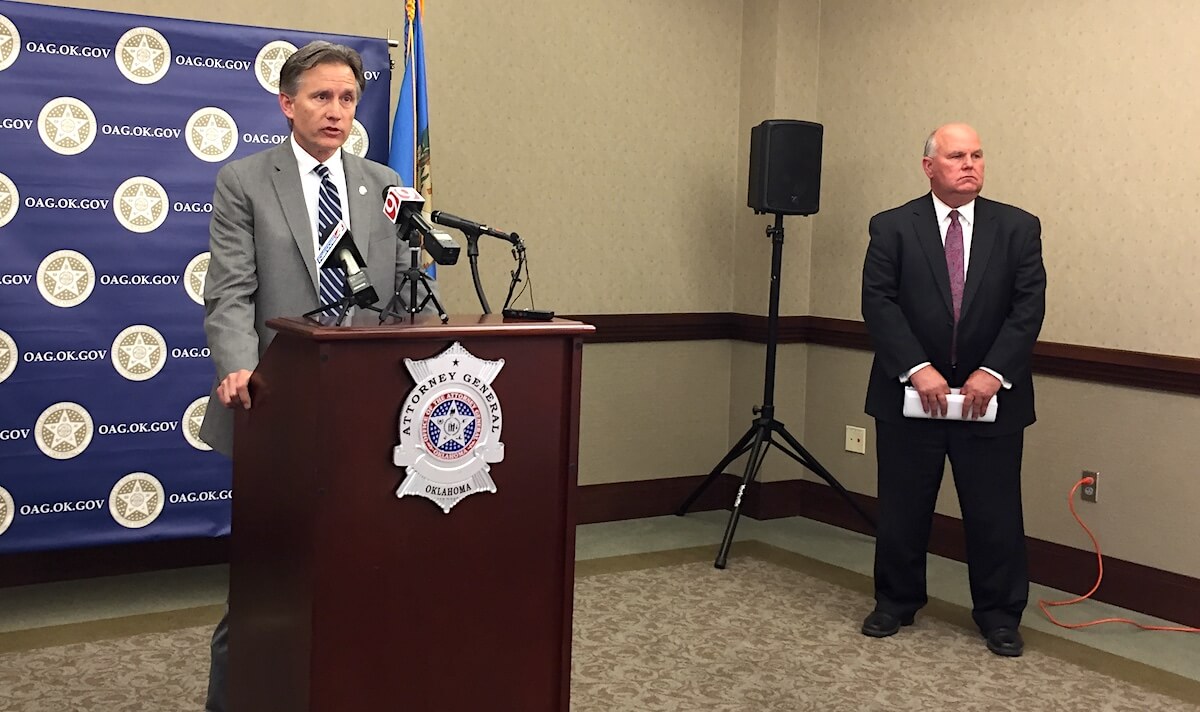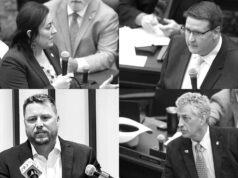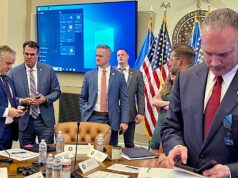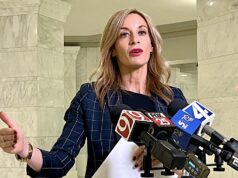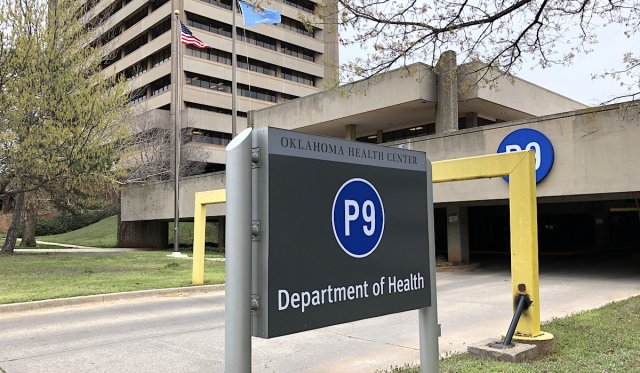
Concern over how the Oklahoma State Department of Health spends money might seem so common that citizens could set their clocks by it. In terms of 2020 political drama, the hour drew nigh at the agency’s blender-shaped building on Northeast 10th Street late Tuesday afternoon.
First reported by The Oklahoman, Attorney General Mike Hunter asked State Auditor and Inspector Cindy Byrd to conduct an investigative audit on the long-troubled agency’s expenditures related to COVID-19. Byrd agreed. One of Hunter’s top deputies then sent a letter to Commissioner of Health Gary Cox outlining his obligations for compliance.
“Refusal of access to records, obstruction of access to records, refusal to search for required information or any other effort to hinder the examination of the state auditor and inspector is prohibited,” Mary Ann Roberts, chief deputy attorney general, wrote. “As it is reasonably foreseeable that the records examined may be evidence in future proceedings, you should take immediate action to preserve any items — including but not limited to electronically stored information — germane to this inquiry. The neglectful or willful destruction of evidence is sanctionable.”
Hunter and his team have encountered financial mismanagement at the Oklahoma State Department of Health before, but their 2018 multi-county grand jury review of OSDH’s financial implosion and its co-mingling of state and federal funds yielded no action.
FROM MAY 2018
Grand jury on Department of Health: Deceit, abuse & incompetence, but no crimes by Tres Savage
“Certainly laws were broken, but there weren’t criminal consequences to those laws,” Hunter said at a news conference May 17, 2018. “If there was criminal behavior here, we’d be prosecuting it. At the end of the day, we couldn’t find anything that we could prosecute.”
Instead, Hunter said “deceit, abuse, mismanagement and utter incompetence” had taken place and that agency leaders had “concealed a slush fund allowing the department to spend without consequence.” Then-Auditor Gary Jones, who had also completed a Health Department audit, joined Hunter at the press conference to announce that the Legislature’s emergency $30 million appropriation in 2017 had somehow been unnecessary.
Hunter told Oklahomans the grand jury wanted the Legislature to amend certain statutes for future consideration, but by then the state agency scandal that had underscored 2018 Republican in-fighting had been put to rest. Functionally, the October 2017 resignations of Commissioner of Health Terry Cline and Senior Deputy Commissioner Julie Cox-Kain had occurred in private, and the pair avoided being injected with the disinfectant of sunlight. Their testimony before the multi-county grand jury never became public.
Stitt touts ‘strong reporting requirements’
If coronavirus-related expenses turn out to be Hunter’s second slurp at OSDH’s malignant milkshake, the state’s top prosecutor will be dealing with a different cast of characters two years later. At the forefront is Gov. Kevin Stitt, who railed on OSDH’s institutional challenges during his 2018 campaign and who quickly panned Hunter’s audit request Tuesday evening.
“It is disappointing that the attorney general would see the need to entangle the agency with an investigation when it is in the midst of responding to the most historic pandemic of our time,” Stitt said in a statement. “I fully expect quick and thorough compliance as we have already put strong reporting requirements in place.”
Stitt appointed Cox, the former Oklahoma City-County Health Department leader, as his commissioner of health in September, despite Cox’s law degree and decades of experience not meeting a statutory higher education requirement.
Rumors of internal strife at the agency arose almost immediately, and the COVID-19 pandemic has exacerbated tension between the agency’s newcomers and long-timers. Cox has struggled to win praise from many employees at the long-beleaguered agency, which endured its “Healthy Futures” marketing scandal, its “ghost employee” scandal and its nursing home bribery scandal all between the mid-1990s and the mid-2000s. Controversy surrounding Oklahoma’s nursing home system and OSDH oversight dates back decades.
Cox received his own negative press April 6 owing to a decision to purchase fancy office furniture and a new state vehicle for his executive use. The car purchase was cancelled days later.
“The Oklahoma State Health Department has been committed to full transparency with COVID information and the Stitt administration’s proactive efforts to protect Oklahomans from the novel COVID-19 virus,” Cox said in a statement Tuesday. “Every step of the way, the agency has been above board and quick to provide information, where legally able, on our transactions to anyone who asks, and we are confident the financial review will demonstrate our efforts for excellence to protect public health. OSDH is prepared to comply and provide any and all information requested by State Auditor Cindy Byrd and her staff.”
But the letter from Roberts, the deputy attorney general, implies significant interest about OSDH and references protections within the Oklahoma Whistleblower Act.
Additionally, reporting from The Oklahoman and the Associated Press has examined the state’s purchases of personal protective equipment (PPE) and medications in response to the COVID-19 pandemic. At a national level, federal law enforcement have been monitoring PPE deals across the country, and Nolan Clay of The Oklahoman reported Tuesday morning that a $9.5 million deal to buy PPE had been cancelled after communication with the FBI.
Gin DeMarco, a deputy tourism director with an energy industry background, has served as Oklahoma’s “czar” of PPE since March at the request of Stitt. Between federal money made available to states for coronavirus response and additional spending powers granted to Stitt by the Legislature during the emergency, the administration has spent and is expected to spend tens of millions of dollars on PPE and other items.
Now, however, Stitt finds himself further at odds with Hunter, the state’s top lawyer who has critiqued the governor’s gaming compact negotiations. Both men have clashed with members of the Legislature over the past year — Stitt mostly on budgetary matters and Hunter on claims he ignored state statute in the settlement with Purdue Pharma. Republican legislative leaders have made court filings contrary to the positions of both GOP statewide officials.
For now, lawmakers are mostly left to watch the latest iteration of drama at the Oklahoma State Department of Health.
“I sure hope none of it is true,” Senate Health and Human Services Chairman Greg McCortney (R-Ada) said Wednesday morning. “I thought (former Commissioner of Health) Tom Bates did a really good job of turning the Health Department around. Morale was moving in the right direction, and it’s sad to see this is happening. Hopefully everything comes out clean, and Commissioner Cox moves forward, and all those people who are working so hard don’t end up with a stain because of something that happened behind the scenes.”
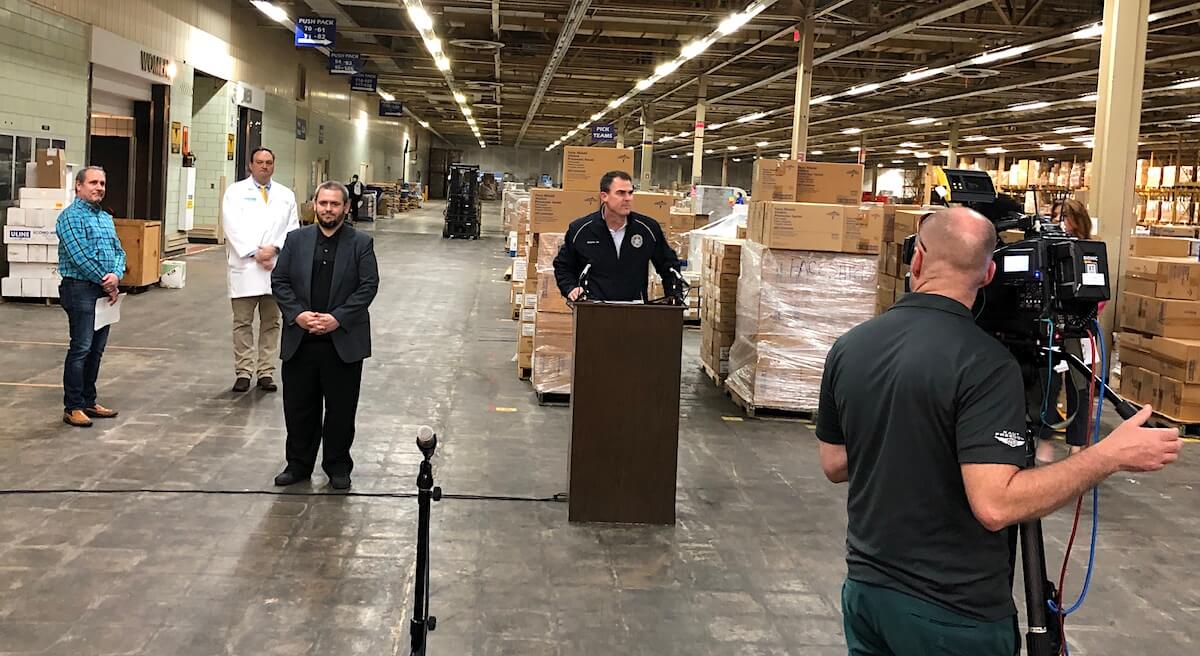
Read Hunter’s letters to Cox, Byrd on OSDH audit
